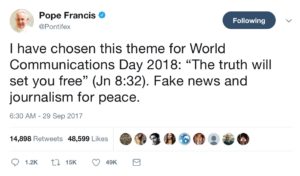 For all the anger and vitriol that is prevalent in our society today, Our Holy Father is a significant voice of calm and peace for the world. We will be hearing and seeing some of the powerful stories of refugees and those most in need from Father Doll next week as part of our retreat, but Pope Francis has provided a significant call to action (and prayer) last month for his annual World Communications Day Message:
For all the anger and vitriol that is prevalent in our society today, Our Holy Father is a significant voice of calm and peace for the world. We will be hearing and seeing some of the powerful stories of refugees and those most in need from Father Doll next week as part of our retreat, but Pope Francis has provided a significant call to action (and prayer) last month for his annual World Communications Day Message:
Communication is part of God’s plan for us and an essential way to experience fellowship. Made in the image and likeness of our Creator, we are able to express and share all that is true, good, and beautiful. We are able to describe our own experiences and the world around us, and thus to create historical memory and the understanding of events. But when we yield to our own pride and selfishness, we can also distort the way we use our ability to communicate. This can be seen from the earliest times, in the biblical stories of Cain and Abel and the Tower of Babel (cf. Gen 4:4-16; 11:1-9). The capacity to twist the truth is symptomatic of our condition, both as individuals and communities. On the other hand, when we are faithful to God’s plan, communication becomes an effective expression of our responsible search for truth and our pursuit of goodness…
Freedom from falsehood and the search for relationship: these two ingredients cannot be lacking if our words and gestures are to be true, authentic, and trustworthy. To discern the truth, we need to discern everything that encourages communion and promotes goodness from whatever instead tends to isolate, divide, and oppose. Truth, therefore, is not really grasped when it is imposed from without as something impersonal, but only when it flows from free relationships between persons, from listening to one another. Nor can we ever stop seeking the truth, because falsehood can always creep in, even when we state things that are true. An impeccable argument can indeed rest on undeniable facts, but if it is used to hurt another and to discredit that person in the eyes of others, however correct it may appear, it is not truthful. We can recognize the truth of statements from their fruits: whether they provoke quarrels, foment division, encourage resignation; or, on the other hand, they promote informed and mature reflection leading to constructive dialogue and fruitful results.
The best antidotes to falsehoods are not strategies, but people: people who are not greedy but ready to listen, people who make the effort to engage in sincere dialogue so that the truth can emerge; people who are attracted by goodness and take responsibility for how they use language. If responsibility is the answer to the spread of fake news, then a weighty responsibility rests on the shoulders of those whose job is to provide information, namely, journalists, the protectors of news. In today’s world, theirs is, in every sense, not just a job; it is a mission. Amid feeding frenzies and the mad rush for a scoop, they must remember that the heart of information is not the speed with which it is reported or its audience impact, but persons. Informing others means forming others; it means being in touch with people’s lives. That is why ensuring the accuracy of sources and protecting communication are real means of promoting goodness, generating trust, and opening the way to communion and peace.
I would like, then, to invite everyone to promote a journalism of peace. By that, I do not mean the saccharine kind of journalism that refuses to acknowledge the existence of serious problems or smacks of sentimentalism. On the contrary, I mean a journalism that is truthful and opposed to falsehoods, rhetorical slogans, and sensational headlines. A journalism created by people for people, one that is at the service of all, especially those – and they are the majority in our world – who have no voice. A journalism less concentrated on breaking news than on exploring the underlying causes of conflicts, in order to promote deeper understanding and contribute to their resolution by setting in place virtuous processes. A journalism committed to pointing out alternatives to the escalation of shouting matches and verbal violence.
To this end, drawing inspiration from a Franciscan prayer, we might turn to the Truth in person:
Lord, make us instruments of your peace.
Help us to recognize the evil latent in a communication that does not build communion.
Help us to remove the venom from our judgements.
Help us to speak about others as our brothers and sisters.
You are faithful and trustworthy; may our words be seeds of goodness for the world:
where there is shouting, let us practise listening;
where there is confusion, let us inspire harmony;
where there is ambiguity, let us bring clarity;
where there is exclusion, let us offer solidarity;
where there is sensationalism, let us use sobriety;
where there is superficiality, let us raise real questions;
where there is prejudice, let us awaken trust;
where there is hostility, let us bring respect;
where there is falsehood, let us bring truth.
Amen.
– Pope Francis 1/24/18 https://w2.vatican.va/content/francesco/en/messages/communications/documents/papa-francesco_20180124_messaggio-comunicazioni-sociali.html
